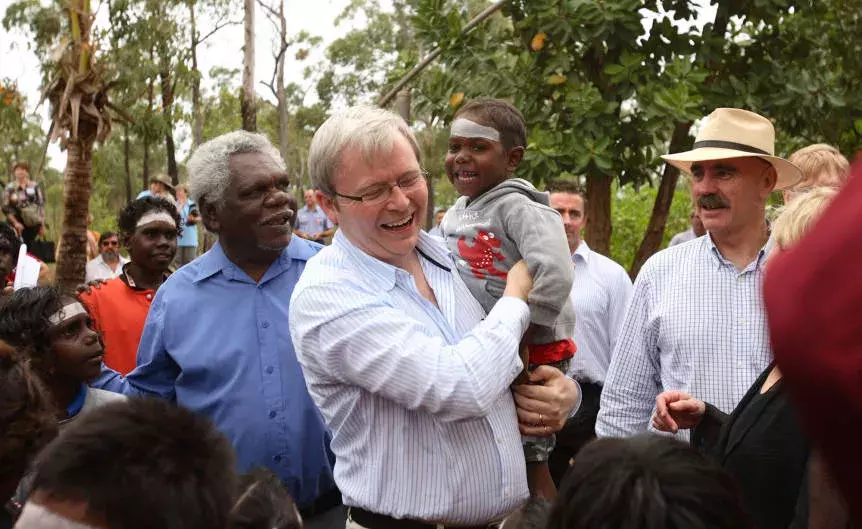KEVIN RUDD
Companion of the Order of Australia (2019)
Kevin Rudd became Australia's 26th prime minister when the Labor Party won office, replacing the Liberal-National Party government led by John Howard. He lost the party leadership and the prime ministership to Julia Gillard in 2010, but became prime minister again after winning a leadership ballot in June 2013.
21 September 1957
Nambour, Queensland
Thérèse Rein
Australian Labor Party
Photo: Fairfax
About
Kevin Rudd attained the leadership of his party, and the prime ministership, without deep factional and personal support within the Labor Party. He came to prominence due to his passion for policy, willingness to engage in politics at both a strategic and tactical level and ability to engage with the public using a range of measures and methods.

Photo: Annette Dew/Newspix
Having grown up in a rural area of Queensland, Kevin Rudd joined the Labor Party at the age of 15. After the death of his father, his family experienced significant hardship and this early experience contributed to a personal commitment to social justice. At school he was a strong debater, and began reading Hansard in his spare time.
He pursued his interest in Chinese language and history at university, and became a diplomat with postings to China and Sweden. Elected to parliament in 1998 for the seat of Griffith, he soon became the Shadow Minister for Foreign Affairs and then, in 2006, Opposition Leader. He defeated the long-serving Howard Government in December 2007.
He initially enjoyed very strong support as prime minister, but this declined to the point where he was replaced as leader in June 2010. After a second brief term as prime minister in 2013 he retired from parliament following the September election defeat.
MILESTONES
Ratification of the Kyoto Protocol
On his first day in office, Prime Minister Kevin Rudd signs the instrument of ratification of the Kyoto Protocol, an international treaty committing signatories to reducing greenhouse gases.
Apology to the Stolen Generations
On 13 February, the Rudd Government moves a motion in Parliament to honour Indigenous peoples, reflect on past mistreatment including the removal of Aboriginal and Torres Strait Islander children from their families, and work towards a future where all Australians are truly equal.
Australia 2020 Summit
The Australia 2020 Summit is held on 19-20 April in Canberra. It brings together 1002 delegates to discuss ten 'critical areas'. Ideas and proposals were also invited from other members of the community.
Address to the UN General Assembly
During an address at the United Nations on 25 September, Rudd calls for a range of reforms to financial institutions, to be developed and implemented through bodies like the Group of 20 nations.
Economic Security Strategy
On 14 October an emergency spending plan is announced with payments totalling more than $8 billion for pensioners, families, first home buyers and training, as a response to the growing Global Financial Crisis.
Nation building and jobs plan
A $42 billion plan for measures including free ceiling insulation, school building projects, local community infrastructure and roads, payments to families and students, as well as business investment tax breaks, is announced as a further response to the severe global recession.
Fair Work Act
The Fair Work Act comes into effect on 1 July 2009, replacing the earlier Work Choices legislation.
360° VIEW
Parliament
The first Rudd government entered the House of Representatives with a comfortable majority, achieving the largest election swing since 1983 and winning 23 seats from the Coalition. In the Senate, the Coalition kept a majority, and the Rudd government relied on negotiations with the Greens, Family First and independent senators to pass legislation.
The first six months of the Rudd government were punctuated with important symbolic moments, including the ratification of the Kyoto Protocol, the Apology to the Stolen Generations and the Australia 2020 Summit.
During this time, Rudd enjoyed a very high level of personal approval with the electorate, which was further bolstered by the positive response to his leadership during the Global Financial Crisis. His government began to struggle after proposing a controversial mining tax, changing their approach to climate change policy and as the consequences of rapid policymaking and implementation, including a problematic home insulation program, began to bite.
The second Rudd government took over control of the minority government of the Gillard years. After coming to power in June, Rudd had just over five weeks to make a few changes before the parliament was dissolved and campaigning began for the September election.

Photo: Glenn Campbell/Fairfax
Highlights
- Kevin Rudd
PM Transcripts, Department of the Prime Minister and Cabinet
- Kevin Rudd
PM Transcripts, Department of the Prime Minister and Cabinet
- Kevin Rudd
PM Transcripts, Department of the Prime Minister and Cabinet

